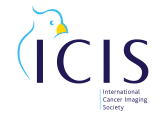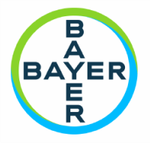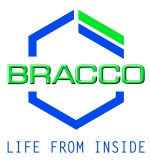Events / Education
International Cancer Imaging Society Meeting and 20th Annual Teaching Course
Sun 19 Sep 2021 Wed 22 Sep 2021 Society
OnlineWe invite you to join us for our first virtual annual teaching course, to be held over four half-days, commencing each day at 13:00 BST.
Join the live stream of sessions covering a broad range of topics related to oncological imaging, and review on-demand content at your convenience to enhance your knowledge.
A parallel stream will host scientific presentations, and posters will be available to view in a dedicated area of the meeting site.
All meeting content will be available until 31 December 2021 as part of the registration fee.
Learning objectives
To improve your knowledge of:
• Cancer diagnosis and staging
• Response assessment
• State of the Art oncological imaging techniques
• Role of imaging in treatment planning
• Cancer genetics
• Interventional radiology for cancer
• Mimics of malignancy
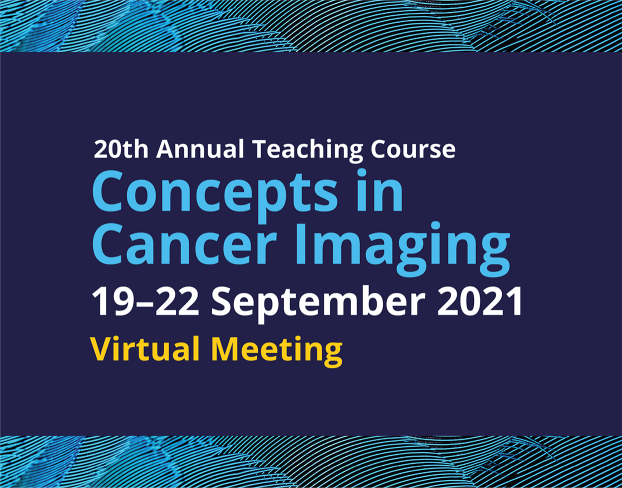
ICIS 2021 will be held as a virtual meeting.
Date: Sunday 19 - Wednesday 22 September 2021
Time: Commencing each day at 13:00 BST
Keynote lectures
State of the Art Oncological Imaging sessions on
- Cancer Genetics
- Imaging Techniques
- Radiation Therapy
- Surgical & Focal Therapies
- Lymphoma
Oncological Imaging: Practical Approach sessions on
- Diagnosis
- Response Assessment
- Staging
- Mimics of Malignancy
- Practical Approach
Case-based workshops on
- PI-RADS v2.1
- Extra-visceral soft tissue masses in the retroperitoneum and abdomen
- Colorectal MRI
- CT/MR LI-RADS
On-Demand lectures on:
- Staging head and neck cancer
- Chemo/immunotherapy toxicity in the chest
- MR imaging of bladder carcinoma
- Artificial intelligence in gynaecology oncology imaging
- Delivering the impacts of MRI-directed pathway for prostate cancer diagnosis
- Solid pancreatic masses
- Focal liver lesions on MRI
- Pitfalls to avoid in determining progressive disease in body oncology
- Open access labelled data to advance machine learning research in Cancer Imaging
HOW TO REGISTER
ICIS 2021 will be delivered as a fully virtual meeting.
Click to enter ONLINE REGISTRATION here to register.
Registration includes access to the four days' live-stream and parallel sessions featuring scientific presentations, a dedicated area of the meeting site to view the scientific and educational posters, and additional pre-recorded on-demand lectures covering a variety of topics. All meeting content will be available to access as part of the registration fee until 31st December 2021."
|
MEMBERS (per person) |
|
£380 |
|
Non-MEMBERS (per person) |
|
£430 |
|
Trainees/Radiographers/Abstract Presenter (per person) |
|
£250 |
|
ICIS Membership (see full benefits here) |
|
£80 |
|
ICIS trainee membership (see full benefits here) |
|
£40 |
IMPORTANT INFORMATION
Reservations will only be confirmed on receipt of the fully completed booking form and full payment. A confirmation letter and further details will be issued on receipt of full payment.
Reservations are subject to availability and will be confirmed within one week from receipt of completed booking form and full payment.
Refunds (minus an administration charge of £70) will only be made if written notification is received by 20th August 2021. Thereafter no refunds will be made.
It is your responsibility to check connectivity of your IT system to ensure suitable bandwidth and internet speed to enable virtual participation; ICIS will not be liable for unstable internet connection degrading the experience of participating in the event. Bandwidth information can be checked using a quick speed test, e.g. https://fast.com
Please direct any questions to Louise Mustoe at [email protected]
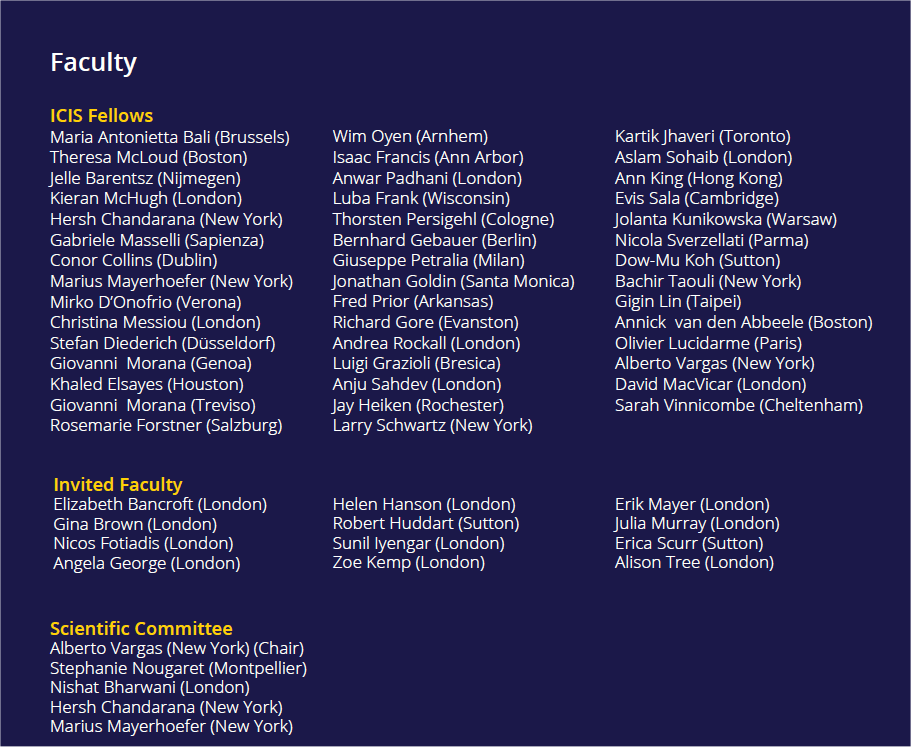
Royal College of Radiologists – a total of 18 CPD credits will be awarded in accordance with the CPD scheme of the Royal College of Radiologists (4.5 credits per day).
European Accreditation Council for Continuing Medical Education (EACCME) accreditation - 14 European CME credits (ECMEC®) granted.
EACCME European CME Credits (ECMEC®s) can be converted to AMA PRA Category 1 Credit™ by applying to the AMA.
Submission deadline: Monday 5 July 2021
Guidelines
You may choose among four different abstract types:
> Oral Scientific Presentation
> Oral Case-Based Presentation
> Poster Scientific Presentation
> Poster Educational Presentation
Oral Scientific Presentation
The abstract should be separated into “Aim”, “Methods”, “Results” and “Conclusion”. The abstract limit is 250 words. Abstracts should not include promissory notes such as “We will provide additional data during our presentation.” Authors of accepted oral presentations will be invited for an online presentation within the Scientific Sessions. Presentation time will be 8 minutes with 2 minutes for Q&A (depending on the final program).
Oral Case-Based Presentation
The abstract should have an image and three teaching points. The abstract limit is 250 words. Abstracts should not include promissory notes such as “We will provide additional data during our presentation.” Authors of accepted oral case-based presentations will be invited for an online presentation within the Scientific Sessions. Presentation time will be 8 minutes with 2 minutes for Q&A (depending on the final program).
Poster Scientific Presentation
The abstract should be separated into “Aim”, “Methods”, “Results” and “Conclusion”. The abstract limit is 250 words.
Poster Educational Presentation
The abstract should be separated into “Learning Objectives”, “Content Organisation”, and “Conclusion”. The abstract limit is 250 words.
Abstracts that do not adhere to the following important points will be rejected:
> The title should not exceed 15 words. The title should be in bold, sentence case with no full stop at the end and no underlining.
> The abstract should not exceed 250 words.
> Please use authors’ initials and surnames only. No full stop at the end. Underline the name of the corresponding author. A comma should separate author names. Where authors are from a number of different institutions, the appropriate institution number from the affiliation list should be given as a superscript number immediately after each author's name, e.g.: John Smith1, Susan Jones2, Bill Fisher3. An asterisk * should be used to link the corresponding author with their email address
> Affiliations should include institute, town and country. Where there are multiple affiliations, each should be listed as a separate paragraph. Each institute should appear in the order used against the author names (see above paragraph) and show the appropriate superscript number, e.g.:
1 University, Town, State, USA
2 University, Town, UK
3 Company, Town, Country
> Qualifications should be omitted.
> Do not include references, tables or figures.
> Please do not use block capitals.
Main text
In structured abstracts, paragraph headings should be typed in bold with no colon at the end. Do not use the heading ‘Abstract’. Each heading should be in a separate paragraph.
Aim
Followed by regular text, on a new line and in the same format as shown above for main text.
Materials & Methods
Results
Conclusions
Consent to publish If the abstract contains details relating to individual participants (for example a case report), written informed consent for the publication of these details must be obtained from the participants and a statement to this effect should appear at the end of the abstract. Our guidelines for consent statements can be found here: http://www.biomedcentral.com/about/editorialpolicies#Ethics.
If the patient is deceased consent for publication should be obtained from the next of kin and if the patient is under 16 consent should be obtained from the parent or guardian.
Please find examples below
Proceedings of the 20th International Cancer Imaging Society Annual Teaching Course
Abstracts selected for presentation will be published in the Proceedings of the 20th International Cancer Imaging Society Annual Teaching Course, which will be made available online for all faculty and delegates. A downloadable version of your submission will be made available to our membership on the members only area of our website, and will be available on the Cancer Imaging open access website. Authors of selected abstracts will be notified after Friday 30 July 2021.
It will be obligatory for all scientific presenters to be members of ICIS at the time of online presentation. The annual membership fee of £80 will be added to the scientific presenters’ fee at registration if current membership is not in place. Please note that we have a discounted trainee membership at £40 for those who send a letter from their Head of Department, confirming their trainee status. Membership will run for one year from date of registration; all standard member benefits will apply.
Financial help will be available for junior proffered presenters. This will be decided on application and on a case-by-case basis.
Applicants for financial aid please email [email protected] for further information.
Queries may be addressed to the ICIS Secretariat by email to: [email protected]
EXAMPLE – ORAL CASE BASED PRESENTATION
Diagnosis: Advanced Cervix Cancer
Sala E.
Memorial Sloan Kettering Cancer Center, New York, USA
Images:
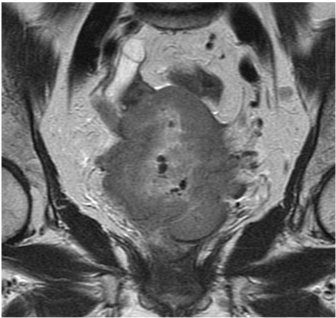
Teaching/Discussion points:
> Discuss the role of MRI in treatment slection and planning of patients with cervical cancer
> Describe MRI Features of parametrial and pelvic sidewall invasion
> Highlight potential pitfalls
EXAMPLE - POSTER EDUCATIONAL
Chemotherapy induced cardiomyopathy: an overview, imaging features, and future prospective
Firstname A Lastname1*, Firstname B Lastname2, Firstname C Lastname3
1University, Town, State, USA
2University, Town, UK
3Company, Town, Canada
*Email address of corresponding author if being included
Learning objectives:
To review the spectrum of imaging findings of chemotherapy- induced cardiomyopathy in correlation with most common cytotoxic drugs and regimens.
Content organisation:
Cardio toxic effect of chemotherapy is a well-recognized problem in cancer patients. Cardio toxicity depends on multiple predisposing factors, specific components of the chemotherapy regimen, length of treatment, and dosage.
We will present the spectrum of most common cardiotoxic chemotherapy agents and their combinations, specific effects on the myocardium, and imaging features of cardiomyopathies induced by chemotherapy.
We will review pathophysiology of chemotherapy induced cardiomyopathy including:
- Dose dependent cardiomyopathy
- Predisposing conditions –diabetes, presence of coronary artery disease, age.
- Potential reversibility
We will discuss imaging characteristics of chemotherapy induced cardiomyopathy
- Imaging modalities ( Echocardiography, Cardiac MR, and MUGA)
- Importance of monitoring cardiac function during and after treatment
- Distribution of late Gadolinium enhancement (LGE)
- Emerging technologies for early diagnosis of cardiomyopathy in cancer patients
Conclusions:
Chemotherapy induced cardiomyopathy is a common problem among cancer patients, increasing long term morbidity and mortality and often leading to disability. Patients receiving chemotherapy treatment, particularly cardio toxic agents, should be routinely assessed for cardiac function to diagnose cardiomyopathy during the early phase of treatment and to prevent development of irreversible heart failure.
EXAMPLE POSTER SCIENTIFIC
The value of 68Ga-PSMA enhanced MR-PET in patients with biochemical recurrent prostate cancer
Firstname A Lastname1*, Firstname B Lastname2, Firstname C Lastname3
1University, Town, State, USA
2University, Town, UK
3Company, Town, Canada
*Email address of corresponding author if being included
Aim: In patients with prostate Cancer increased levels of PSMA can be measured. Recently a new tracer, 68Ga-PSMA, was developed as a specific marker for hybrid imaging (PET/CT, MR-PET). In this study we evaluated the accuracy of 68Ga-PSMA in patients with rising PSA after radical prosatectomy, so called „biochemical recurrent prostate cancer“ (BRPC).
Materials and Methods: A total of 322 patients with BRPC underwent a MR-PET examination (Siemens Biograph mMR) after injection of about 150 mBq 68Ga-PSMA. Images were evaluated in cosensus by one experienced nuclear medicine physician and one radiologist. Pelvine lymphnode dissection was performed in most of the patients according to a predefined template with 8 fields. Lymphnode involvement was evaluated according to a 5 point scale with a patient- and a field-based analysis. These findings were startified according to PSA-values.
Results: Four patients were excluded from the study for different reasons. Sensitivity for detection of recurrence was 95.7 % for PSA-values ≥ 2ng/ml, 81.4 % for PSA-values of 1-2 ng/ml, 76% for PSA-values 0.5-1 ng/ml, and 51% for PSA values ≤ 0.5 ng/ml. In comparison to the MR-images alone MR-PET was of superior diagnostic value.
Conclusions: MR-PET using 68Ga-PSMA is a sensitive and highly accurate technique for the diagnosis of biochemical reccurence of prostate cancer after radical prostatectomy. It yields high diagnostic performance at relatively low PCA-values.
|
Don’t take our word for it. Read what our delegates said about our 2019 annual teaching course: • I found all the lectures useful and informative with a lot of information that can be integrated in daily practice . The venue, lecturers and support staff were exceptional and the gala evening was absolutely superb!!! Thank you for your hard work and making this possible. . • In our practice nobody wants to miss ICIS. Because the well-prepared lectures on multi parametric hybrid imaging help us understand tumour biology. • Extremely interesting conferences and workshops, great faculty. Well organised in every aspect. • One of my favourite meetings. Great locations, not too big, some outstanding speakers and all the latest in cancer imaging in one place. There's something for everyone who reports cancer scans here; from general to sub-specialists. A friendly faculty always helps too. |
Applications are invited for sponsorship to cover registration fees to participate in the virtual ICIS 2021 Annual Teaching Course.
Please email your CV and a covering letter outlining how ICIS 2021 will benefit your practice to [email protected], with the heading ‘ICIS 2021 sponsorship application’.
Trainees should also submit a letter of support from your Head of Department.
The deadline for applications is Monday 16 August 2021.
You will be notified by Monday 23 August 2021 whether or not your application has been successful.
